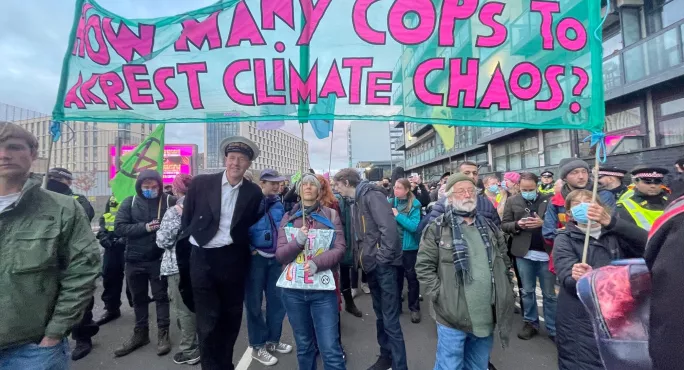Teachers are really important when it comes to educating young people about climate change because they are “a trusted source”, according to researchers at a COP26 event.
However, the researchers - whose findings were based on a series of workshops run with young people aged 16-18 in England - also found that climate change education in school was restricted to certain subjects areas and that, while young people were already engaged with climate change issues, there was “some misunderstanding”. For instance, other environmental issues such as ozone depletion were confused with climate change.
The researchers - who were speaking yesterday during a session in the COP26 Green Zone in Glasgow - said that this signalled the importance of making sure “young people are aware of the science” and warned that young people did not always understand common technical terms and jargon - those in the workshops had not heard of COP26, for example, and did not know what was meant by “net zero”.
COP26: 3 big things teachers can learn about during COP26
Long read: The key role that schools can play in tackling the climate crisis after COP26
WATCH: Nobel winner’s COP26 message for old schools
Climate change: How can pupils and teachers get involved in COP26?
Quick read: How to use COP26 to reduce pupil climate anxiety
Global reach: How our school will bring COP26 to students worldwide
Alison Anderson, professor of sociology at the University of Plymouth, said: “One of the issues that we found was the use of jargon and certainly, with the young people in our workshops, many of them weren’t really aware of some of the technical terms - they hadn’t heard of COP26 and other terms that are regularly used like net zero. That didn’t mean anything to them.
“That’s also the case with many adults as well so it’s really important to make sure communication is clear and meaningful to the particular audience you are talking to.”
When it came to climate change, the researchers - who used an interactive game to stimulate discussion - found that young people got information from platforms such as TikTok, Instagram and YouTube, but they were often unconcerned about where the content they were engaging with had come from.
Professor Anderson said: “We found ambivalence around sources in terms of young people having loyalty to a media platform - whether that’s TikTok or whether that’s YouTube - but not really being aware of the original sources of the information that’s being shared and also not necessarily being aware of the political bias that may be attached to that content.
“And teachers, as well as family and friends, are a really trusted source of information about climate change. So teachers are really important in terms of climate change communication - young people have a high degree of trust in them. Yet when you look at the national curriculum - at least in the UK - climate change is actually restricted to being taught in geography and science lessons and does not really come into any other areas.”
Reporter @Emma_Seith is at #COP26 today - follow her for updates through the day. @COP26 https://t.co/rtNTAWikzB
- Tes Scotland (@TesScotland) November 3, 2021
Young climate activists taking part in a panel discussion at the end of the session made a plea to teachers to inform their pupils about climate change, even if the curriculum did not demand it.
Adélaïde Charlier, who co-created the Belgian youth climate movement, said: “When I go to [speak in a] school, I ask teachers ‘don’t leave the kids alone’ - tell us about it, explain to us what is going on, because it is not really included in our programmes to talk to us about what is happening in the world in terms of the climate emergency.”
S6 student Layla Whitson from @Gala_Academy attending #cop26 #GreenZone speaking about how they feel about the climate emergency pic.twitter.com/Zo5kuT75kp
- Emma Seith (@Emma_Seith) November 3, 2021





